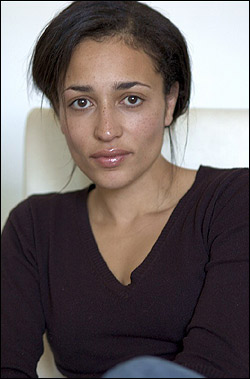Zadie Smith swears she is not her own worst critic. “Oh no, there are much worse. Google a little! There are people who hate me way more than I hate me,” she says lightly, speaking by cell phone from a cozy hammock in her North London backyard. Despite this protest, Smith has been unusually outspoken about her defects. Shortly after the publication of her debut novel, White Teeth, in 2000, she denounced it as “the literary equivalent of a hyperactive, ginger-haired tap-dancing 10-year-old” and compared her style to “a script editor for The Simpsons who’d briefly joined a religious cult and then discovered Foucault.” Smith’s penchant for self-flagellation suggests a combination of cunning and wisdom. Pre-emptively dismissing her books disarmed reviewers, who, in backlash to the hype around White Teeth, damned her as a fashionable multicultural wunderkind. Her autocritiques also served as a defensive shield, preventing all that praise from clogging up her brain while she pushed her own boundaries.
That’s what she’s done with On Beauty (Penguin, $25.95), her third novel, which veers away from the flashy wit and diverse London backdrops of White Teeth and The Autograph Man and instead offers an ambitiously sprawling, gentle homage to E.M. Forster’s Howards End disguised as an American campus novel. Like Forster’s book, it depicts the collision of two very different families: the boisterously liberal Belseys and the deeply traditionalist Kipps. Howard Belsey is a white art history professor in the throes of midlife crisis. His marriage to his vibrant African-American wife, Kiki, is collapsing, due to his unfaithfulness. And he’s devoting too much psychic energy to an ideological pissing war with Monty Kipps, an Anglo-Caribbean provocateur who arrives at Belsey’s elite Massachusetts university disparaging affirmative action and generally aggravating the liberal Belseys with his ultraconservative rhetoric.
Far from setting out to write an academic novel, Smith says she’s not even a fan of the genre, aside from Nabokov’s Pnin. “If I had more experience in work environments, I would have chosen a different profession, but my longest experience has been in universities,” she admits sheepishly, having recently spent a year as a fellow at Harvard. Although there are plenty of sharply etched campus scenes, her goal was to follow these characters into their living rooms and explore “the way very intelligent people occasionally mess up their personal lives.”
Smith says she admires the emotional richness evoked by Forster’s muddled structures and erratic creations. “When I read novels, their failures are part of what I love about them. Part of the joy of them is that there’s always a blind spot, and I’m interested in the way writers fail to give you what you want, even the greatest writers.”
Speaking of the somewhat angry and isolated figure of Kiki, Smith says that she sensed this loneliness in her own mother, a working-class kid who became a psychoanalyst. “When you’re black and middle-class, you’re alone—everybody else is white. You have to talk like them and act like them. But then when I’d see Mum get together with a few of her black colleagues, they’d act like different people, because they could let loose. You’re doing really well, but you’ve had to transform yourself in order to do it.”
Smith herself has undergone a huge transformation over the last five years, from geeky Cambridge student to Booker- short-listed superstar. “You have a sense of yourself as a kid from the underground. Then you write a book and a million people buy it—you’re obviously a little more populist than you thought, so that’s a bump to the ego!” she says with a husky laugh. On top of that, she offers, “I’m obviously extremely middle-class now. I’m sitting in a hammock, which is extremely suspect.” She lives across the street from the housing project where she grew up and sometimes feels nostalgic for her humble roots— especially when stuck at a starchy dinner party so boring she wants to rip out her eyeballs. “That didn’t use to happen when I was working-class. And there are vital parts of the culture I’ll forever be removed from.”
Still, Smith’s success has provided an amazing freedom that allows her to write at her own pace—or not write at all. She insists we shouldn’t expect her planned essay collection (tentatively titled Fail Better) anytime soon, considering how well this lazing-around-in-the-backyard thing is going. “It’s hard to write in a hammock. You shouldn’t try.”
Zadie Smith will appear at Elliott Bay Book Co., 4 p.m. Fri., Oct. 7; and at Neumo’s (925 E. Pike St., 206-709-9467; 21-and-over; free), 8 p.m. Fri., Oct. 7.




